ICSE Class 10 English Literature Question Paper Solution is provided here for students to boost their exam preparation. After practising the questions of Literature in English 2020 paper, students can easily identify the important topics and difficulty level of questions. Also, they get an idea of the types of questions most likely to be asked in the English Literature paper.
Download ICSE Class 10 English Literature Question Papers Solutions 2020 PDF
The ICSE Class 10 English Literature 2020 exam was conducted on 6th March 2020. The exam started at 11 am, and students were allotted 2 hours to complete the paper. They can download the ICSE Class 10 English Literature Question Paper Solution 2020 PDF from the link below.
ICSE Class 10 English Literature Question Paper 2020
Download ICSE Class 10 English Literature Question Paper Solution 2020 PDF
Students can have a look at the ICSE Class 10 English Literature Question Paper Solution 2020 below. They can also access the year wise ICSE Class 10 English Literature Solved Previous Year Question Papers for more practice.
Difficult Topics of ICSE Class 10 English Literature 2020 Question Paper
Below we have listed down the topics/questions which students found difficult while attempting the ICSE 2020 English Literature Question Paper.
- Question 1(ii): Who are the ‘Sisters Three’?
- What role were they thought to play in the lives of humans?
- Question 2 (iii): According to Shylock, in what other ways did Jews resemble Christians?
- Questions which are based on what comes right before and after an extract (e.g. Question 2, candidates could not recall what Shylock had said after the extract).
- Question 7 (v): Colours the poet associate with:
(a) a maiden.
(b) a middle-aged woman.
How does the poet describe the thoughts and concerns of women in both these stages of life?
- Question 9 from “Abou Ben Adhem”.
- Question 12 from “The Blue Bead”
- Analytical questions.
- Questions requiring explanation of lines.
ICSE Class 10 English Literature Question Paper 2020 With Solutions
Question 1:
Read the extract given below and answer the questions that follow:
Launcelot: But, I pray you, ergo, old man, ergo,
I beseech you, talk you of young Master Launcelot?
Gobbo: Of Launcelot, an’t please your mastership.
Launcelot: Ergo, Master Launcelot. Talk not of
Master Launcelot, father; for the young gentleman,
according to Fates and Destines, and such odd
sayings, the Sisters Three and such branches of leaning,
is indeed, deceased; or, as you would say
in plain terms, gone to heaven.
(i) What information does Gobbo seek from Launcelot at the beginning of this scene? What does Launcelot say has happened to Gobbo’s son?
(ii) Who are the ‘Sisters Three’? What role were they thought to play in the lives of humans?
(iii) Who was Launcelot’s master?
What gift had Gobbo brought him?
What does Launcelot want him to do with it?
(iv) What reasons does Launcelot give for wanting to leave his present master’s service? Whom does he wish to serve instead?
(v) Why does Gobbo have trouble recognising Launcelot? What purpose does this scene serve in the context of the play?
Answer:
(i)
• The way to Shylock’s OR master Jew’s house OR does Launcelot live with him
• had died (deceased) / gone to heaven
(ii)
• Greek mythology three sisters = three Fates / Destinies/ Clotho, Atropos, Lachesis
• Controlled the destiny of humans / had power of life and death over humans/ Clotho spun the thread of life/ Lachesis measured [gave] the thread of life/ Atropos cut the thread.
(iii)
• Shylock or the Jew
• dish of doves
• give it to Bassanio instead
(iv)
• He is starving / famished / “you may tell every finger I have with my ribs.”
• Launcelot fears that he will become a Jew if he served Shylock (a Jew) for much longer./ He is ill-treated / Shylock is the Devil incarnate / He is the very Jew, or typical Jew
• Bassanio
(v)
• Launcelot is dressed well / like a gentleman.
• Launcelot speaks with the air of a gentleman.
• Gobbo cannot see very well or sand blind or half blind.
• Launcelot has grown a dense, bushy beard.
• Serves to provide comic relief / reveals Shylock’s nature as a cruel master / conflict between good and evil / Bassanio is a kind person / good master/Bassanio is leaving for Belmont/ Launcelot’s attitude towards his master.
Question 2: Read the extract given below and answer the questions that follow:
SHYLOCK: To bait fish withal. If it will feed nothing
else, it will feed my revenge. He hath disgraced
me and hindered me half a million, laughed at my
losses, mocked at my gains, scorned my nation,
thwarted my bargains, cooled my friends, heated
mine enemies—and what’s his reason? I am a Jew.
Hath not a Jew eyes? Hath not a Jew hands, organs,
dimensions, senses, affections, passions? Fed with the
same food, hurt with the same weapons, subject
to the same diseases, healed by the same means,
warmed and cooled by the same winter and summer
as a Christian is? If you prick us, do we not bleed?
(i) Who is ‘He’?
What does Shylock want from him?
What does Shylock mean by ‘to bait fish withal’?
(ii) Explain in your own words any three ways in which ‘he’ had wronged Shylock.
(iii) According to Shylock, in what other ways did Jews resemble Christians?
(iv) How does Shylock use Christian examples to justify his desire for revenge?
(v) The given extract reveals two distinct emotions that Shylock experiences. What are they? Give one reason to justify each of these emotions.
Answer:
(i)
• Antonio or the merchant of Venice
• A pound of flesh / revenge
• To use as bait to catch fish/ use the flesh to catch fish/ use for fishing/ nobody should question him / sarcastic / satisfy his thirst for revenge
(ii) Any three of the following:
• He hath disgraced me (Shylock) / hindered me (Shylock) half a million
• laughed at my (Shylock’s) losses / mocked at my (Shylock’s) gains / scorned my (Shylock’s) nation / thwarted my (Shylock’s) bargains / cooled my (Shylock’s) friends / heated mine (Shylock’s) enemies.
• Spat on gaberdine/ spat on beard / gives money gratis/ calls him a misbeliever/ hates the Jewish race / kicked him like a cur / Shylock hates Antonio because he is a Christian.
(iii) Jews are like Christians:
• laugh when tickled
• die when poisoned
• seek revenge when wronged
(Any two)
(iv) Shylock argues that:
• When a Jew wrongs a Christian, the Jew is humiliated in revenge.
• Therefore, following the example set by Christians.
• If a Christian were to wrong a Jew, then it is appropriate that the Jew take revenge on the Christian.
(v) Emotions: Anger / thirst for revenge / Hurt / pain / bitterness / pain / malice / suffering / sadness; sorrow/ jealousy
• caused by humiliating treatment at the hands of Christians.
• caused by insensitivity, unfair treatment of Jews by Christians (any two reasons from the play)
Question 3: Read the extract given below and answer the questions that follow:
Portia: The quality of mercy is not strained;
It droppeth as the gentle rain from heaven
Upon the place beneath: it is twice blessed;
It blesseth him that gives and him that takes:
‘Tis mightiest in the mightiest; it becomes
The throned monarch better than his crown:
(i) Where does this scene take place?
Why is Portia here?
Why does Bassanio not recognise her?
(ii) To what is mercy compared in these lines?
Why is mercy said to be ‘twice blessed’?
(iii) Explain the lines:
‘Tis mightiest in the mightiest; it becomes
The throned monarch better than his crown”
(iv) Later in her speech Portia mentions a sceptre. What is a sceptre? How, according to Portia, is mercy above the ‘sceptred sway’?
(v) To whom are these words addressed?
What does the person say in response to Portia’s words?
Portia is seen as the dramatic heroine of the play. Using references from the text
mention any two aspects of her character that appeal to you most.
Answer:
(i)
• A court of justice OR Venice
• To resolve the case / save Antonio / help Bassanio’s friend escape from the Jew’s clutches. / to be the judge, lawyer / to act on Bellario’s behalf
• She is disguised / in lawyer’s robes / dressed as a man.
(ii) • To gentle rain
• It blesses the giver
• And the recipient
(iii) • Mercy in a powerful man makes him more powerful.
• Mercy is the most powerful weapon a powerful person can possess
• Mercy suits a king far better than a crown does. (Synonyms of mightiest and becomes; explanation)
Becomes – looks better; attractive; suits.
(iv) • Sceptre – a staff (rod; baton) held by a monarch/ symbol of his authority/ temporal power
• A Sceptre is a symbol of a ruler’s earthly / worldly power – it inspires fear and dread/ symbol of awe and majesty.
• But mercy is an attribute of God / a Divine quality/ so when a ruler shows mercy, he is elevated above the level of earthly kings / raised to the level of God/ mercy has a seat in the hearts of Kings.
(v) • To Shylock
• “My deed upon my head! / I crave the law ready to face consequences / The penalty and forfeit of my bond/ let me have the penalty.”
• Personal Response: Accept any two plausible traits
E.g.
Obedient daughter – was willing to abide by father’s casket test to choose life partner.
Clever / Quick Witted – At Antonio’s trial… outwits Shylock using his own logic.
Sense of humour – the ring episode.
Tactful / wise / helpful / ingenuity / understanding / intelligent.
(2 adjectives or 2 examples, or 1 adjective and 1 separate example).
Question 4: Read the extract given below and answer the questions that follow:
Giles: (Calling) Mollie? Mollie? Mollie? Where are you?
(Mollie enters from the arch Left.)
Mollie: (Cheerfully) Doing all the work you brute. (She crosses to Giles).
Giles: Oh, there you are – leave it all to me. Shall I stoke the Aga?
Mollie: Done.
(i) Where does the opening scene of the play take place? What song is played at the beginning of Act I? Who is the first character to appear on the scene?
(ii) What is the ‘partnership’ that Mollie speaks of later in this scene? Whose idea was it?
(iii) Who is Mrs. Barlow? Why is Giles annoyed with her?
(iv) Who is the first guest to arrive at Monkswell Manor? Describe this person.
(v) What were this person’s expectations when he arrived at the Manor? To what extent were they fulfilled?
Answer:
(i) • Monkswell Manor / the great hall / hall
• Three Blind Mice
• Mollie / Mrs. Ralston / Mrs. Giles
(ii) • The plan to convert (run) the place, Monkswell Manor / which she had inherited from her aunt / into a Guest house instead of selling it / Giles will help her
• Mollie’s
(iii) • Mrs. Barlow – the daily woman / who helped Mollie with housework / maid / local woman
• She has left early / because of the bad weather / this left all the work on Mollie’s shoulders / left the work for Mollie.
(iv) Christopher / Wren
Young / wild-looking man / neurotic / long or untidy hair / wears a woven artistic tie / trusting(confiding) / childish manner / love to cook.
(v) He had been expecting
• Mollie to be the wife of a retired General / (Indian Army) – terribly serious (grim) / Memsahibish / haughty / widow of an Army personnel / not as he had pictured her
• That the place would be full of Benaras brass utensils / are there any birds of paradise / if there were any wax flowers.
• Delighted / found the place heavenly / lovely proportions / appreciates the furniture (the table was genuine) / he was going to love that place.
• Calls it ‘Absolutely perfect / Real bedrock respectability.
Question 5: Read the extract given below and answer the questions that follow:
Mrs Boyle: I am Mrs Boyle. (She puts down the suitcase)
Giles: I’m Giles Ralston. Come into the fire. Mrs Boyle, and get warm. (Mrs
Boyle moves down to the fire.)
Mrs Boyle: A Major-Metcalf is it? -is carrying it?
Giles: I’ll leave the door open for him.
(i) Who is Mrs Boyle? Why is she in a bad mood?
(ii) Describe Major Metcalf. Mention any one action of his which indicates that he is a polite and courteous man.
(iii) How does Major Metcalf describe the weather outside?
(iv) What comments does Mrs Boyle make when she first encounters Mollie?
(v) Mention three reasons that Mrs Boyle gives for being unhappy with Monkswell Manor. What is your impression of Mrs Boyle?
Answer:
(i) • Mrs. Boyle is one of the guests at Monkswell Manor / a large / imposing / ill-tempered
woman / a magistrate / she has sent the children to Longridge Farm
• In a bad mood because
Expected to have been met / had great trouble in getting a taxi / had to share a taxi from the station / she had to come with Major Metcalf / Taxi had stopped at the gate / wouldn’t risk coming up the drive / the drive must at least have been cleared of the snow.
(ii) Major Metcalf:
• Middle aged / Square shouldered man / Very military in manner or bearing / polite and courteous / respectful
• He carries Mrs. Boyle’s heavy suitcase for her / Takes his hat off when he sees Mrs. Boyle – sign of respect.
(iii) • Absolute blizzard / a storm / snowstorm
• Thought that they might never reach their destination
• As the roads were so bad in this weather / I think we will have 5 or 6 feet of snow / not seen anything like this in years.
(iv) • Says Mollie is very young (says it accusingly)
• Too young to be running an establishment like a guest house.
• Mollie lacked the experience that the task required / says that it was an old house / hopes
that house hadn’t got dry rot / the house could have had a coat of paint / they had worm in the oak / there was no indoor staff.
(v) Any three of the following:
• The house is very old
• Sniffs the air and hopes that Monkswell does not have dry rot.
• It needed a coat of paint
• There was worm in the Oak / it was not a running concern (first time they had opened it).
• No proper staff / advertising was misleading / amenities not up to the mark / complaint
about the food (all the reasons given in answer 1 are applicable here)
Personal Response: (any one)
She is finicky / fault finding / fussy old lady / very difficult to please / judgmental / authoritative / commanding / Any other plausible answer
Question 6: Read the extract given below and answer the questions that follow:
Trotter: It’s true, isn’t it, that Jimmy, the child who died, managed to get a letter
posted to you? (He sits at the Right end of the sofa). The letter begged for
help – help from this kind young teacher. You never answered that letter.
Mollie: I couldn’t. I never got it.
Trotter: You just-didn’t bother
(i) Explain what Mollie means by, ‘I couldn’t. I never got it.’
(ii) What was Trotter’s real name?
How was he related to Jimmy?
How did he gain entry into the Manor?
(iii) What did Trotter accuse Mollie of doing?
How did he intend to punish her for it?
(iv) Who had come to England in search of Trotter?
How was this person related to Trotter?
What clues from their past did this person use to remind Trotter of their childhood days?
(v) Who had guessed Trotter’s identity correctly?
Why was this person in the Manor?
Mention two ways in which the setting of the play serves to heighten the air of mystery and suspense.
Answer:
(i) • Mollie was sick (pneumonia) / She could not answer the letter/ Mollie could not help
• Jimmy’s letter was put aside with others (she did not receive the letter).
• She found it weeks later / by then it was too late / Jimmy had already died.
(ii) • Georgie / George
• He was Jimmy’s brother
• By pretending to be a Sergeant (policemen) / arrived on skis / he ran from a call box and said he was speaking from Police Headquarters.
(iii) • Of turning her back on little Jimmy / ignoring his pleas / not answering his letters / Causing Jimmy’s death
• Kill her / strangle her to death
(iv) • Ms. Casewell / Kathy / Catherine
• Trotter’s sister
• She talked about the farm / the fat pig / the day the bull chased them across the field / the dogs Spot and Plain / the animals.
(v) Major Metcalfe OR Miss Casewell
• He was a policeman on Georgie’s trail / sent to prevent murders at Monkswell Manor / two addresses were written in the notebook / Longridge farm, Monkswell Manor / police thought it was vital to have someone on the spot.
• Miss Casewell – she had come to England to find her brother / she was one of the Corrigan children.
• Any two plausible reasons such as:
The Manor was isolated – cut off / no help at hand / tune of nursey rhyme – three blind mice / The blizzard kept them snowbound / The telephone lines were down / darkness in the room / announcement on radio about the murder.
Question 7: Read the extract given below and answer the questions that follow:
Bangle sellers are we who bear
Our shining loads to the temple fair…
—The Bangle Sellers, Sarojini Naidu
(i) Why does the poet use the word ‘delicate’ to describe the bangles?
How is ‘rainbow-tinted circles of light’ an appropriate description of bangles?
(ii) Explain the following phrases from the poem in your own words:
- Shining loads
- Lustrous tokens of radiant lives
- For happy daughters and happy wives.
(iii) The poet uses several images of sight and sound to create a musical effect in the poem. Mention any three examples of these images.
(iv) What are the emotions that the poet associates with a bride on her wedding day? What colours are the bangles on her wrist that reflect these emotions?
(v) What colours does the poet associate with:
(a) a maiden
(b) a middle aged woman?
How does the poet describe the thoughts and concerns of women in both these stages of life?
Answer:
(i) • Bangles are probably made of glass – fragile – easily broken
• Rainbow tinted à multicoloured / all colours of the rainbow / many coloured.
• Circles of light – shape of bangle is circular / they reflect the light / luminous / round/ bright
(ii) • Shining loads – bangles
• Lustrous tokens of radiant lives – Shining symbols / of happy fulfilled lives / bright / contented / prosperous.
• For happy daughters and happy wives – intended for girls and women at different stages in their lives / different ages / for unmarried girls and married women / maidens, married ladies / young, elderly.
(iii) Sight – flushed like the buds / shining loads / lustrous token of radiant lives / aglow with bloom / fields of sunlit corn / silver blue like mountain mist / rainbow tinted circles of light/ flame of the marriage fire / glory of newborn leaves.
Sound – tinkling / bridal laughter
(iv) • Passion / desire / happiness / pain / joy / sorrow
• Colours – red and gold / sunlit corn / yellow or gold / hues of marriage fire / orange red
(v) • Maiden – blue / silver / pink / flushed bud / green / new born leaves
• Middle aged woman – purple / gold flecked grey
• Maiden’s thoughts and concerns: dreams of a happy future / looking forward / hope / longing
Middle aged woman’s thought and concerns: looks back with pride at having borne and
raised children / served family and worshipped God at husband’s side / good mother / good
wife.
Question 8: Read the extract given below and answer the questions that follow:
But a caged bird stands on the grave of dreams
His shadow shouts on a nightmare scream
His wings are clipped and his feet are tied
So he opens his throat to sing.
– I Know Why the Caged Bird Sings, Maya Angelo
(i) In the context of the poem who is a ‘free bird’ and who is a ‘caged bird’?
What mood do the above lines convey?
(ii) How does a free bird live his life?
What are the things he thinks of and dreams about?
(iii) What does the caged bird sing about?
What are the restrictions that a caged bird has to deal with?
(iv) What do you understand from the title of the poem?
What do you like about the poem?
(v) Explain what you understand by the following lines:
• ‘…a bird that stalks
down his narrow cage’
• ‘he names the sky his own’
Answer:
(i) • Any person who is free to make life choices / white.
• A person whose life is restricted by rules and laws imposed on them / black / African American
• Desperation / frustration / defiance / sadness / horror / fear / suffering / pain / agony. (Any plausible answer)
(ii) • Free to do as he pleases / soars high / leaps / floats / dips wing / dares to claim the sky
• Thinks of ‘another breeze’ / other places / good food ‘fat worms’ / enjoys trade winds soft / names the sky as his own.
(iii) Freedom / he craves / has never experienced / things unknown / still longs for them.
• bars (of cage) / he can seldom see; restricted view
• narrow cage / clipped wings / tied feet.
(iv) Title – Maya Angelou / autobiographical / Poet can empathise with a caged bird / feels the agony of black people / had suffered a traumatic childhood and therefore could identify and understand the condition of a bird in a cage. She understood what compels a bird in a cage to sing.
The caged bird represents those who are oppressed / indicates racial discrimination / discrimination based on gender / restrictions.
Personal Response: What do you like? (Any plausible reason / aspect of the poem accepted)
(v) • . … a bird that stalks down his narrow cage – paces / impatient / enraged by limitation
of cage / bird represents people who are oppressed / African American not free /
confined, helpless / can hardly move.
• Names the sky his own – sense of freedom / without limit / claims the wide-open spaces
/ the sky belongs to him: he owns the sky / shows his courage and confidence.
(Any other plausible response)
Question 9: Read the extract given below and answer the questions that follow:
Abou Ben Adhem (may his tribe increase!)
Awoke one night from a deep dream of peace,
—Abou Ben Adhem, Leigh Hunt
(i) What did Abou Ben Adhem see when woke from a deep sleep one night? [3]
(ii) What did Abou Ben Adhem ask the angel? What was the angel’s response?
(iii) What did Abou request the angel to do when he learnt that his name did not appear
among the names of those who loved the Lord? What does this reveal to us of Abou Ben Adhem’s character?
(iv) When and how did the angel appear to Abou Ben Adhem again? What did the angel show Abou this time?
(v) What does the poet mean by ‘May his tribe increase!’?
Why do you think he says this?
What is the central message of the poem?
Answer:
(i) • room flooded with moonlight
• an angel
• writing in a golden book
(ii) • Abou Ben Adhem asked the angel what it was writing
• Angel replied: the names of those / who love the Lord.
(iii) • Abou asks angel to write his name as one who loves his fellow human beings
• Abou was a devout man – dedicated his life to the service of others.
• He served God by serving others / gentle / kindness / saintly / noble / optimistic / humble
/ gentle / devout / pious / spiritual / humane / cheerful
(iv) • Next night
• In a blinding flash of light that awakened Abou.
• Abou’s name at the top of the list of names of those / whom ‘Love of God’ had blest.
(v) • May there be more and more people like Abou Ben Adhem / more of his kind
• The world needs more people who devote their lives to the service of others (personal response).
Central message: The best way to show your love for God is to engage in the service of your fellow human beings / love your neighbor / be kind / service to God will bless you.
Question 10: Read the extract given below and answer the questions that follow:
“Well, Mr. Easton, if you will make me speak first, I suppose
I must. Don’t you ever recognize old friends when you meet
them in the West?”
The younger man roused himself sharply at the sound of her
voice, seemed to struggle with a slight embarrassment which
he threw off instantly, and then clasped her fingers with his
left hand.
“It’s Miss Fairchild,” he said, with a smile. “I’ll ask you to
excuse the other hand; “it’s otherwise engaged just at
present.”
(i) Describe Miss Fairchild and Mr. Easton.
(ii) Where does the above conversation occur?
Why was Mr. Easton embarrassed when Miss Fairchild addressed him?
(iii) How was Mr. Easton’s other hand ‘otherwise engaged’?
How does Miss Fairchild react when he raises his right hand to show her what he meant?
(iv) How does Miss Fairchild feel about Mr. Easton?
How does she try to convey these feelings to him?
(v) The story has a surprise ending. How is the surprise revealed to the reader?
Answer:
(i) Fairchild – pretty, young, dressed elegantly, an experienced traveler, voice showed that she was used to speaking and being heard / attractive / rounded cheeks / sweet voice full and deliberate.
Easton – handsome / bold / frank / young.
(ii) • In a railway coach / on the east bound B & M express / on a train / compartment
• He was handcuffed / was being taken to prison for counterfeiting / and did not want her to know this.
(iii) • It was handcuffed.
• Glad look in her eyes slowly changed / to bewildered horror / glow faded from her cheeks / lips parted in distress.
(iv) • She is attracted to him / possibly loves him / friends / likes him / has feelings.
• How? – by assuring Easton that she never had been interested in the Ambassador
• By declaring that she loved the West (believing that he was a Marshal in the west) – that she could live there happily.
• Saying that money wasn’t everything (Implying that she was prepared to give up a life of comfort in the East and move West to be with Easton)
• Says – I will see you soon in Washington.
You are one of the dashing heroes who write and shoot and get into dangers.
You have been missed from the old crowd
It is too bad you are not going to the west.
(v) • Through the conversation of two passengers who had overheard the exchange between Ms. Fairchild and Mr. Easton.
• One of them mistook Easton for the Marshal and commented on his youth “Pretty young to hold an office like that, isn’t he?”
• The other passenger realised his friend’s mistake and pointed out a vital clue – an officer would never handcuff a prisoner to his right hand!!
• The reader understands / infers that the glum faced man was actually a kind hearted Marshall and Easton was the prisoner.
Question 11: Read the extract given below and answer the questions that follow:
So the little girl walked about the streets on her naked feet, which were red and blue with cold. In her old apron she carried a great many matches, and she had a packet of them in her hand as well.
(i) Who was ‘she’?
What can you conclude about her condition from the above description?
(ii) What time of the year was it? Why did she not want to go home?
(iii) What did she use the matches for? What happened when she lit the first match?
(iv) Whom did she love dearly? What did she say when this person appeared before her?
(v) What happened to the little girl at the end of the story? Would you consider this a happy ending or a sad one? Give one reason for your answer.
Answer: (i) • The Little Match Girl / The Little girl
• No shoes – feet were naked, red and blue / old apron
• She came from a desperately poor home – no shoes at the peak of winter.
• Pathetic / miserable / cold / poor
(ii) • Winter / New Year’s Eve / 31st December / last evening of the year
• She had not sold any matches (or earned a single penny) – this would make her father very angry – he would beat her.
• Home was very cold too – wind whistled through the roof which was stuffed with rags and straw.
(iii) • For light and heat / warm herself / numb fingers.
• A great iron stove with polished brass knobs and ornaments appeared before her.
• A fire burned beautifully in it / gave out warmth / when she stretched her feet to warm them the stove vanished / simply an illusion.
(iv) • Her grandmother
• begged her grandmother to take her with her.
• Was afraid her grandmother would vanish / like all the other beautiful visions had that evening / the warm stove, the roast goose and the glorious Christmas Tree.
(v) • she died
• Either Happy + reason: All her troubles ended and she joined her grandmother in heaven where she would not feel cold or hunger / needs.
OR
Sad + reason: A little life full of promise is put out. Indifference of society to her suffering. Irony that she died of cold and starvation at a time / season when all the world talks about giving to others.
Question 12: Answer the following questions with reference to Norah Burke’s short story “The Blue Bead”
(i) Describe Sibia’s experience at the Bazaar.
What were the things that filled her with wonder?
(ii) Who were the Gujars? Give a brief description of their lifestyle.
(iii) Describe how Sibia rescued the Gujar woman from the crocodile.
What did Sibia regard as the highlight of that fateful day?
What does this tell us about Sibia?
Answer:
(i) • Amazed at the sweetmeats – brilliant honey confections – smelled wonderful – sweets were green and magenta
• Cloth stall with rolls of new cotton cloth
• Satin sewn with silver thread
• Tin trays from Birmingham
• Sari with bits of glass embroidered into it.
• Dawn coloured silks sold by a Kashmiri travelling merchant.
• The little locked chest with turquoises and opals belonging to the merchant
• Best of all a box – when you pressed it a bell tinkled and a yellow chicken jumped out.
• Milling people or crowds / dogs and monkeys full of flees / gossiping and bargaining people / bell of the sacred bull / spitting betel juice
(ii) • Nomadic graziers (nomads) / junglis / born and bred in the forest / man in pastoral wandering age
• Lived in grass huts – temporary shelters / they got their living from the animals, grass and trees
• Fetched water from the river
• Counted wealth in large herds and silver jewellery/ wore large rings made with melted coins
• Since the Gujars were nomads they moved on when plants and shrubs for grazing their animals were depleted.
• Other reasons were inability to sell butter and milk.
• They would leave a place when a tiger was taking away their cattle.
(iii) • Gujar woman was attacked when she came to collect the water.
• The woman screamed, dropped her pots and turned away but the crocodile’s jaws closed on her leg.
• She clung to a log jammed between rocks – a crocodile pulled on her leg.
• Sibia saw this – leapt over the rocks – reached the spot.
• She aimed at the crocodile’s eye – drove the hayfork at the eyes – one prong went right in.
• Crocodile reared up in pain – tail and nose almost meeting as it convulsed – crashed back into the water and vanished.
• Sibia helped the fainting woman – dragged her from the water – bound her wounds with a rag and helped her home to the Gujar camp. (six in totality)
• Finding the blue glass bead for her necklace.
• That she is at heart an innocent little girl no different from other girls her age despite all her bravery and her heart is gladdened by something she considers pretty / it speaks about her poverty / happiness in all achievements / overlooked a brave achievement.
Question 13: Read the extract given below and answer the questions that follow:
How they toiled and sweated to get the hay in! But their efforts were rewarded, for the
harvest was an even bigger success than they had planned. Sometimes the work was hard;…
(i) What hardships did the animals face when they began the harvest?
(ii) How long did they take to complete the harvest? What was the result?
(iii) What other hardships did they face later that year?
(iv) Describe the Sunday routine on Animal Farm.
(v) What contribution did Boxer make to the farm work which earned him the admiration of his fellow creatures?
Answer:
(i) • The animals faced problems as all farming tools had been designed for the human beings.
• No animal was able to use any tool,
• that involved standing on his hind legs.
(ii) • two days less than it had taken Jones and his men the year before.
• It was the biggest harvest that the farm had ever seen.
• there was no wastage not an animal on the farm had stolen as much as a mouthful.
(iii) • Later in the year, when they harvested the corn, they had to tread it out in the ancient style.
• blow away the chaff with their breath
• there was no threshing machine on the farm.
(iv) • On Sundays there was no work breakfast was an hour later than usual
• after breakfast, a flag was hoisted, the hoof and horn painted on the green flag signified the future Republic of Animals
• later all the animals assembled in the big barn for a Meeting where the work for the coming week was planned, resolutions were put forward and debated.
(v) • Boxer worked equal to three horses, from morning to night he was pushing and pulling
• He was always at the spot where the work was hardest – some days the entire work of the farm seemed to rest on his shoulders.
• he arranged to be woken up half an hour before others, put in volunteer labour at whatever seemed to be most needed
• ‘I will work harder!’ was his personal motto.
Question 14: Read the extract given below and answer the questions that follow:
These two disagreed on every point where disagreement was possible. If one of them suggested sowing a bigger acreage with barley, the other was certain to demand a bigger acreage of oats, and if one of them said that such and such field was just right for cabbages, the other would declare that it was useless for anything except roots.
(i) Who were the two who disagreed on every point?
What special skills did each of them possess?
(ii) What was Snowball’s dream project?
How, in his opinion, would it transform life on Animal Farm?
(iii) How did Snowball work out the details of this project?
Where did he do the planning?
(iv) How did the farm animals view Snowball’s effort?
What was Napoleon’s response to it?
(v) Later on, at a Sunday meeting of the farm animals, Snowball is expelled and Napoleon assumes charge.
What immediate changes does he announce regarding the running of Animal Farm.
Answer: (i) • Snowball and Napoleon
• At the meetings, Snowball often won over the majority by his brilliant speeches
• Napoleon was better at canvassing support for himself
(ii) • The building of a windmill.
• it would light the stalls – give warmth in winter
• would run a circular saw – a chaff-cutter – a mangel-slicer – an electric milking machine.
(iii) • Snowball took mechanical details from 3 books that had belonged to Mr. Jones.
• He worked with a piece of chalk held between his trotters to make drawings on the floor of a shed
• He used a shed once used for incubators with a smooth floor, suitable for drawing on
(iv) The farm animals could understand nothing of Snowball’s complicated drawing but they were very impressed by it – came to see it at least once a day.
Napoleon kept aloof – arrived one day – walked around – looked closely at the plans – sniffed at them – then lifted his leg, urinated over the plans and walked out.
(v) Napoleon dominates
• abolishes the Sunday morning Meetings considered meetings a waste of time
• announces that all matters pertaining to the working of the farm would be settled by a special committee of pigs presided over by himself
• animals would still assemble on Sundays to salute the flag and sing ‘Beasts of England’ there would be no more debates and discussions.
Question 15: With reference to George Orwell’s ‘The Animal Farm’, answer the following questions:
(i) What decisions were made regarding the retiring age of the animals at the beginning when the laws of Animal Farm were being formulated?
(ii) What ‘improvements’ in their lifestyle compared to the days of Jones did Squealer point out to the animals when a reduction in their rations was announced to the animals during the next winter on Animal Farm?
(iii) What stories did Moses the raven tell the farm animals?
What effect did these stories have on the animals?
What does this tell us about their living conditions?
Answer: (i) • Horses and pigs to retire at 12 years, dogs at 9 years, sheep at 7, hens and geese at 5 years.
• Liberal old age pensions were agreed upon
• A corner of the field was to be fenced off and reserved as grazing ground for superannuated animals.
• Pension was fixed as
Horses – 5 pounds of corn a day / in winter 15 pounds of hay with a carrot or an apple on public holidays.
(ii) • The animals now had more oats, hay and turnips than in Jones’ day.
• They worked shorter hours
• Their drinking water was of better quality.
• They lived longer
• A larger proportion of their young ones survived infancy.
• Had more straw in their stalls
• Suffered less from fleas.
• They had been slaves under Jones and now they were free.
(iii) • Talked about Sugar Candy Mountain
• Sugar Candy Mountain (on the other side of the dark cloud) was a happy country where poor animals could rest forever from their labours.
• Moses said he had visited the mountain and seen the everlasting fields of clover and linseed cake and lump sugar
• Many animals believed in his stories – their present lives were full of labour, hunger and misery – they were happy to believe in a better after world.
• Pigs were contemptuous of Moses and his stories – called them lies.
• Yet they allowed him to stay on the farm – Without working – with a daily allowance of beer.
• Clearly the animals were suffering untold hardships – lack of food, proper rest.
• They needed Moses’ stories to sustain them through the misery of their daily lives.
Question 16:Read the extract given below and answer the questions that follow:
During the four years since his puppyhood he (Buck) had lived the life of a sated aristocrat;
he had a fine pride in himself, was ever a trifle egotistical, as country gentlemen sometimes
become because of their insular situation.
(i) Where did Buck spend his puppyhood? Describe the place.
(ii) Who were Buck’s parents? What do you know about them?
(iii) What do you understand from the term, ‘sated aristocrat’?
In what way did Buck’s life resemble that of a ‘sated aristocrat’?
(iv) What did Buck do to prevent himself from becoming a pampered house-dog?
(v) What historical event changed Buck’s life of ease forever?
Which member of the household was responsible for bringing about this change?
Why do you think this person acted in this manner?
Answer:
(i) Judge Miller’s place/ Santa Clara Valley, California
Any 2 of the following:
• Stood back from the road, half-hidden among the trees
• House approached by gravelled driveways
• Wide-spread lawns beneath stately poplar trees
• Backyard had stables with dozens of grooms and boys/ servants’ quarters/ outhouses/ grape arbours/ green pastures/ orchards/ berry patches
(ii) • Father – Elmo: a huge St. Bernard/ Judge Miller’s inseparable companion
• Mother – Shep: Scotch Shepherd dog
(iii) • Contented/ fully satisfied nobleman
• Led a life of ease and comfort: Went swimming/ hunting with Judge’s sons
• Escorted Judge’s daughter on long walks
• Lay at Judge’s feet in front of fire in the library
• Stalked imperiously among the terriers and ignored other house dogs
• Considered himself king over all the creeping, crawling, flying things of Judge Miller’s place including humans.
(iv) • engaged in hunting
• other outdoor activity helped him stay fit / kept down fat / hardened his muscles
• love of water was a tonic and health preserver
(v) • the Klondike Strike of 1897
• Manuel, the Gardener’s helper
• He was a gambler / needed money to gamble / believed that one day he would make enough money to meet the needs of his family / tempted by an offer / sold Buck to an agent who was shipping dogs north to draw the sleds in the frozen north.
Question 17:Read the extract given below and answer the questions that follow:
On the other hand, possibly because he divined in Buck a dangerous rival, Spitz never lost
an opportunity of showing his teeth. He even went out of his way to bully Buck, striving
constantly to start the fight which could end only in the death of one or the other. (3.2)
(i) Who was Spitz? Why did he consider Buck ‘a dangerous rival’?
(ii) How did the ‘dominant primordial beast’ which grew in Buck shape his behaviour in his new environment?
(iii) Earlier in the trip, Buck and Spitz were engaged in a violent fight.
What led to the fight? Why did it end abruptly?
(iv) Later in the story, Buck intervened when Spitz was about to punish Pike. Why did he do this? How did Francois reward Buck for this?
(v) In what ways are Buck and Spitz similar?
How are they different from each other?
Answer:
(i) Alpha dog – leader of the pack of huskies
Any 2 of the following:
• Buck was bigger and stronger than Spitz
• Buck was competitive / ambitious and wanted to lead the pack
• Spitz recognised that Buck was more than his equal
(ii) • It grew secretly – new-born cunning gave him poise and control
• Avoided fights – did not pick any/ refused to be provoked
• Became more deliberate/ did not act in haste/ rashly
• Very careful not to betray impatience when Spitz was around, avoided all offensive action
(iii) • The team had camped for the night at Lake le Barge and Buck had dug out a nest for himself for the night. When he returned from dinner he found it occupied by Spitz.
• Reacting in rage and pent-up frustration, Buck attacked Spitz who was ready for the attack/ equally ready to fight
• The fight was interrupted and had to be abandoned because the camp was invaded by a pack of desperate, starving huskies – they ate the store of food and then attacked the team of dogs.
(iv) • Because Buck wished to openly challenge Spitz’s leadership
• Buck wanted to undermine Spitz’s authority and to make the other dogs see him as leader
• Francoise was unfair – lashed at Buck with his whip for challenging Spitz’s role
(v) Similarities: (Accept any other plausible response)
• Both dogs were strong/ fit/ alpha males
• Highly competitive/ proud
Differences:
• Buck is imaginative/loyal/ a survivor – quick thinking/ Fights savagely but only when provoked
• Spitz is devious/ treacherous/ cruel and pugilistic (meaning he’ll readily start a fight)
Question 18: Answer the following questions with reference to Jack London’s, ‘The Call of the Wild’.
(i) Why is Buck regarded as the protagonist (the hero) of Jack London’s book ‘The Call of the Wild’?
(ii) After Spitz’s death Buck was made leader of the dog team. In what ways did Buck prove to be better than Spitz in his role as leader of the team?
(iii) Explore the themes of love and loyalty as revealed in the relationship between Buck and Thornton in Jack London’s novel, ‘The Call of the Wild’.
Answer: (i) • The evolution of Buck’s character is the focus of the story.
• The novel traces his life from the time he is a happy four-year-old basking in the California sun to a tough competitor
• Buck emerges as a faithful, loyal companion, and finally to the leader of a wolf pack in the wil.
• Buck is noble, admirable, and shows remarkable loyalty (to Francois and Perrault) and love (for Thornton) – protagonist-like qualities.
(ii) • Good judgement/ quick thinking and quick acting
• Laying down the law
• Enforcing the law – making the other dogs follow
• The team recovered old-time solidarity
(iii) • Buck’s love and loyalty to Thornton is the result of extremities of circumstance – they save each other’s lives on more than one occasion.
• Thornton saves Buck’s life on different occasions (from death by club/starvation/will to die)
• Buck in turn saves Thornton’s life when he gets in a bar fight.
• On another occasion Thornton almost drowns but is again saved by Buck.
• Thornton wins a huge sum of money by betting Buck can pull an enormous load.
• Thornton goes in search of gold and a lost cabin with his partners and is killed by natives.
• Buck seems unable to respond to the call of the wild until after Thornton’s death.
• This suggests that perhaps his love and loyalty for the man are stronger than his more primeval urges.
We hope students must have found this information on “ICSE Class 10 English Literature Question Papers Solutions 2020” helpful for their studies. To get the year-wise ICSE Class 10 Previous Years Question papers along with solutions for other subjects, click here. Keep learning and download the BYJU’S App to access interactive study videos.
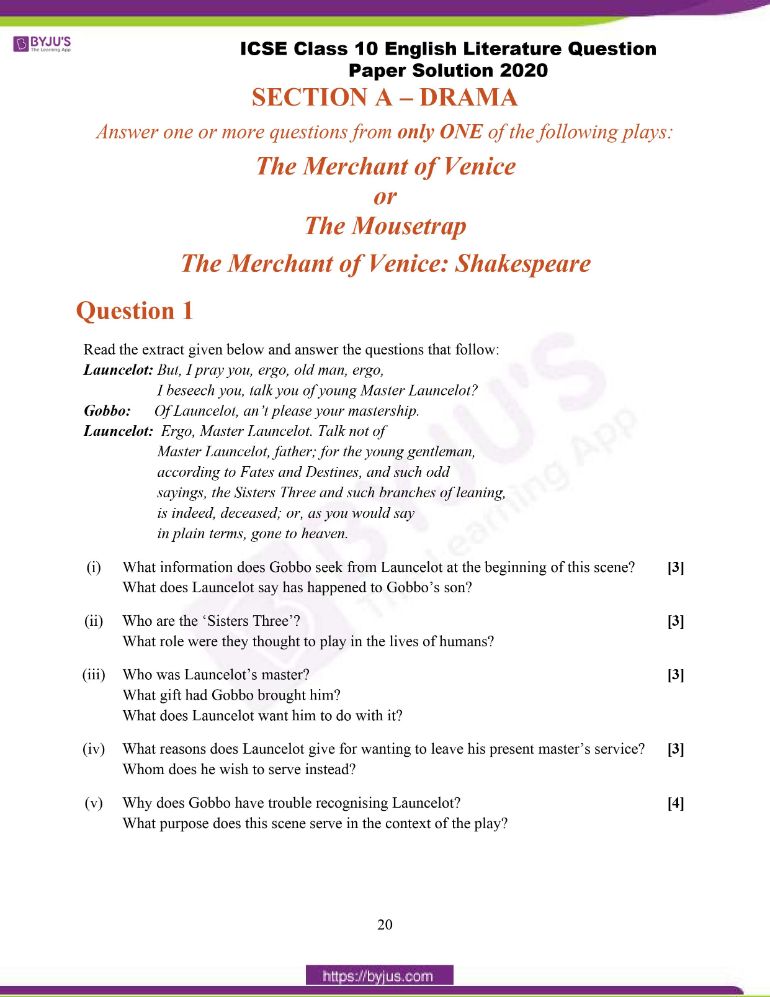
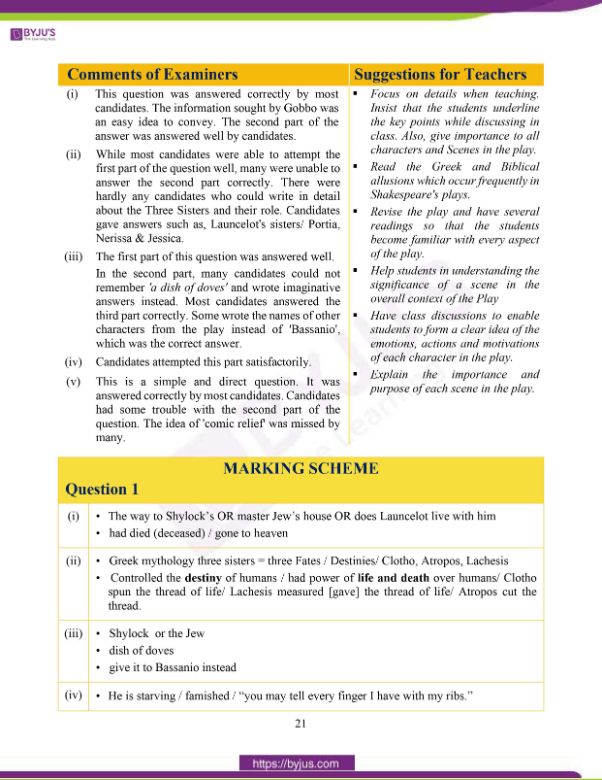
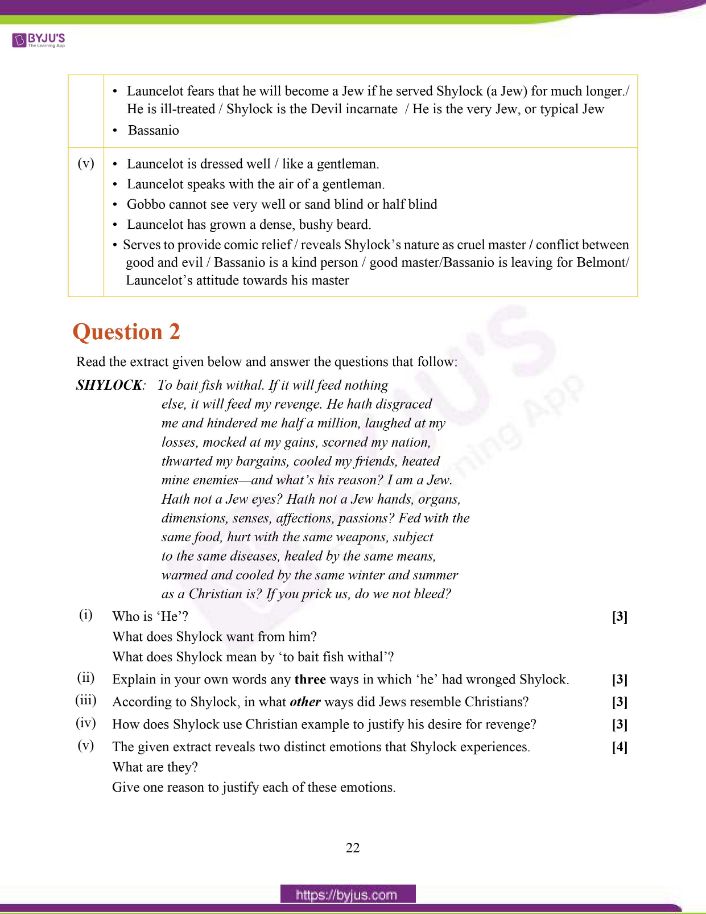
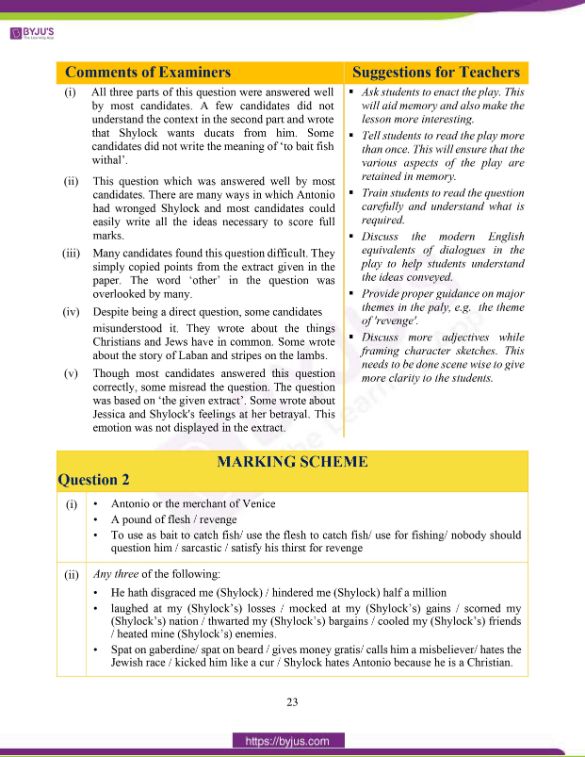
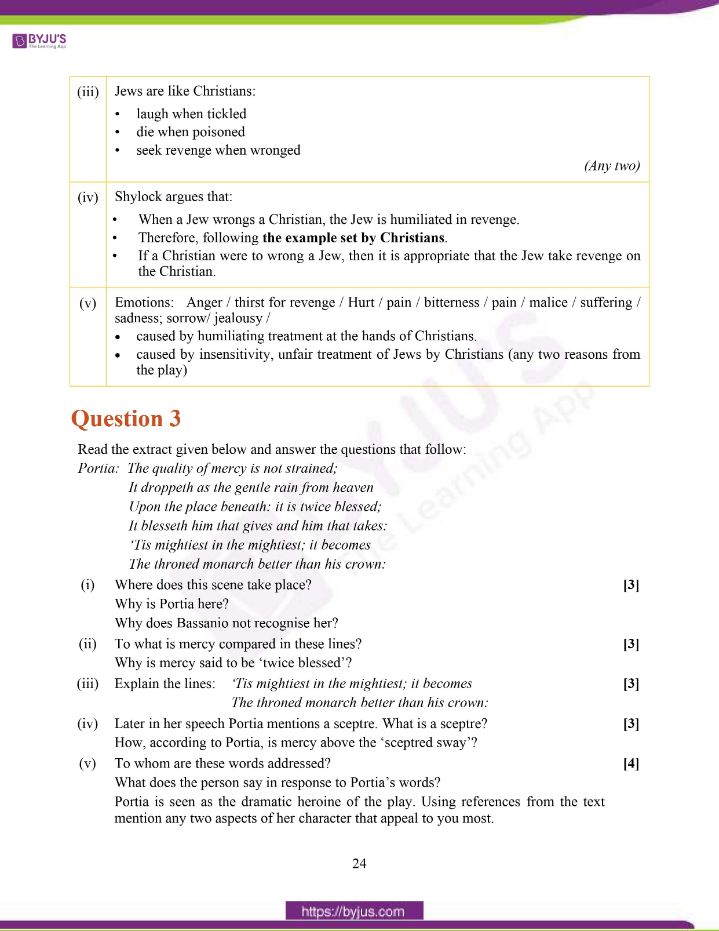
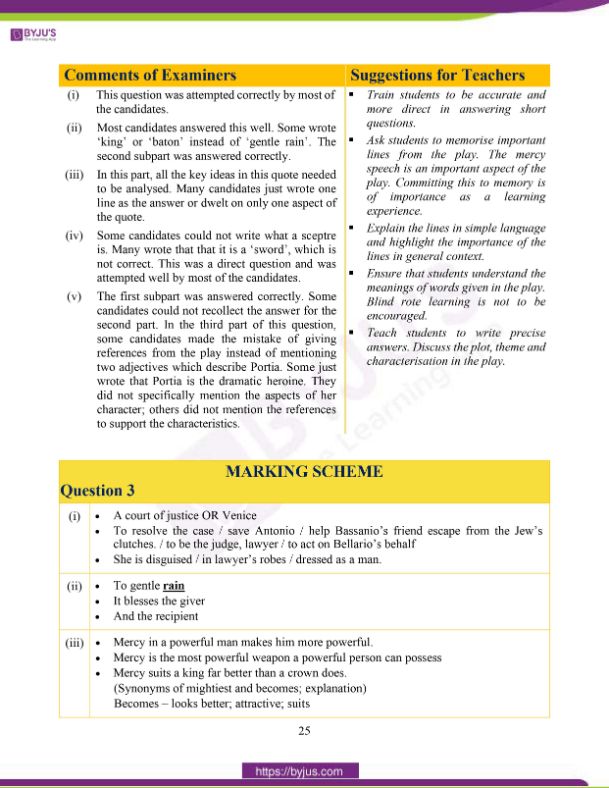
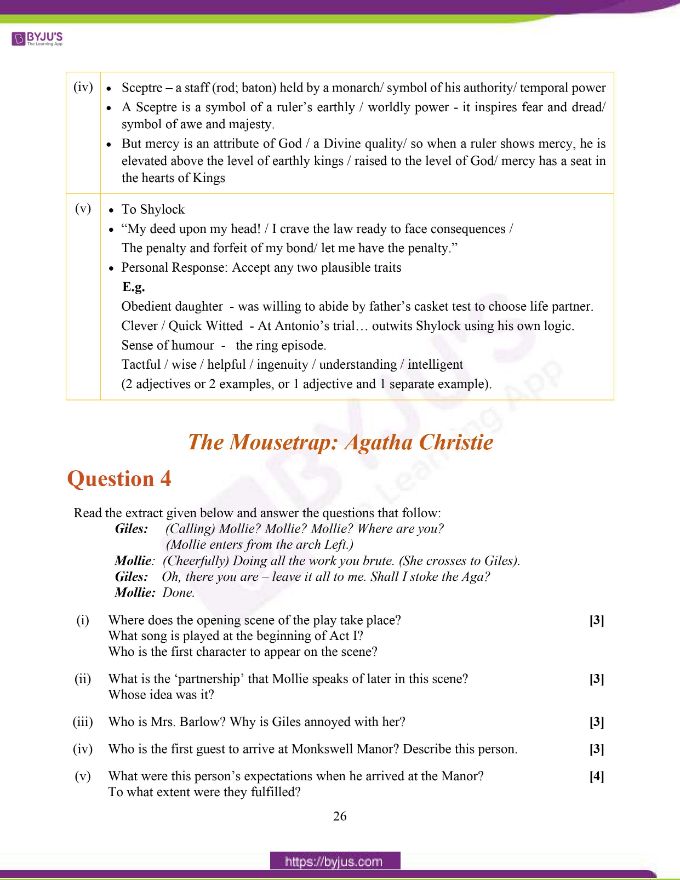
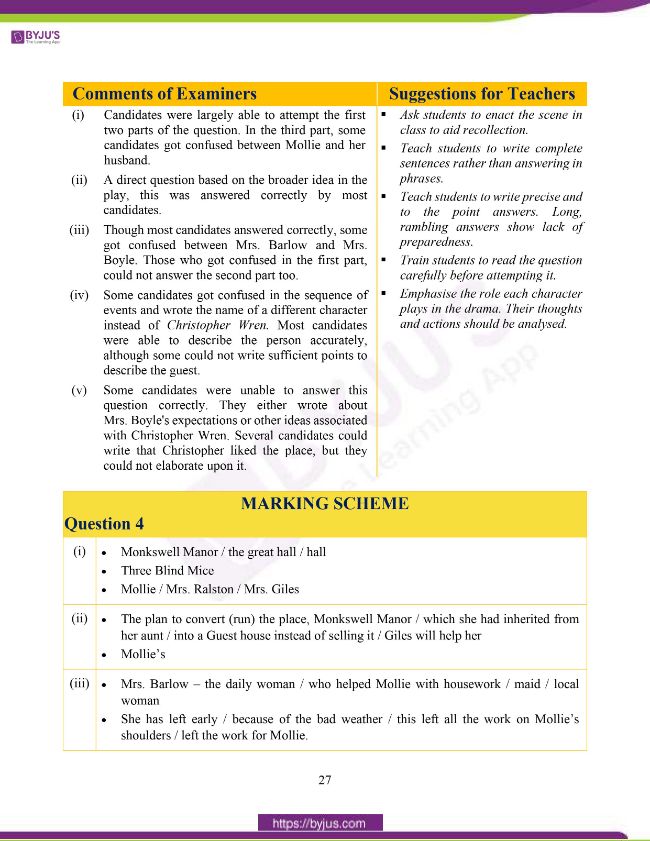

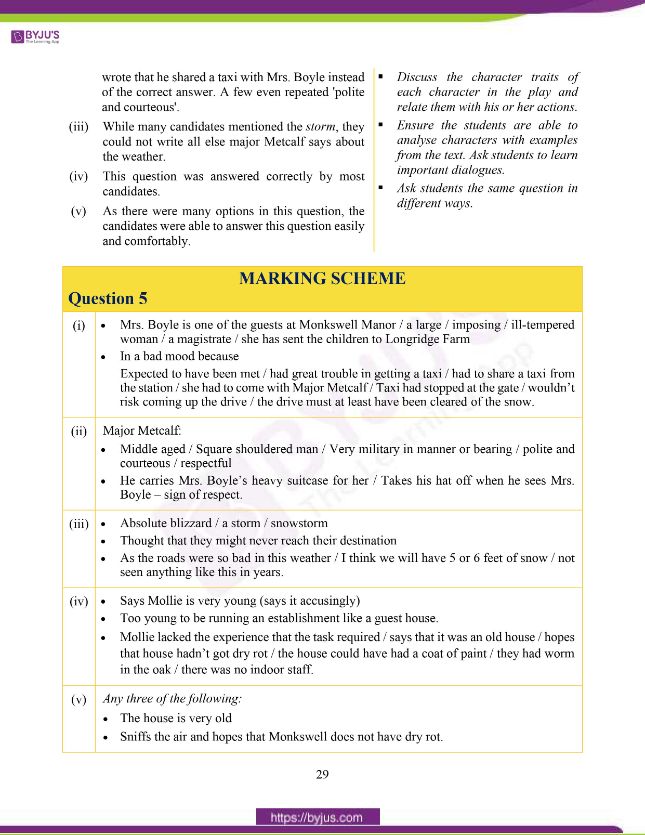
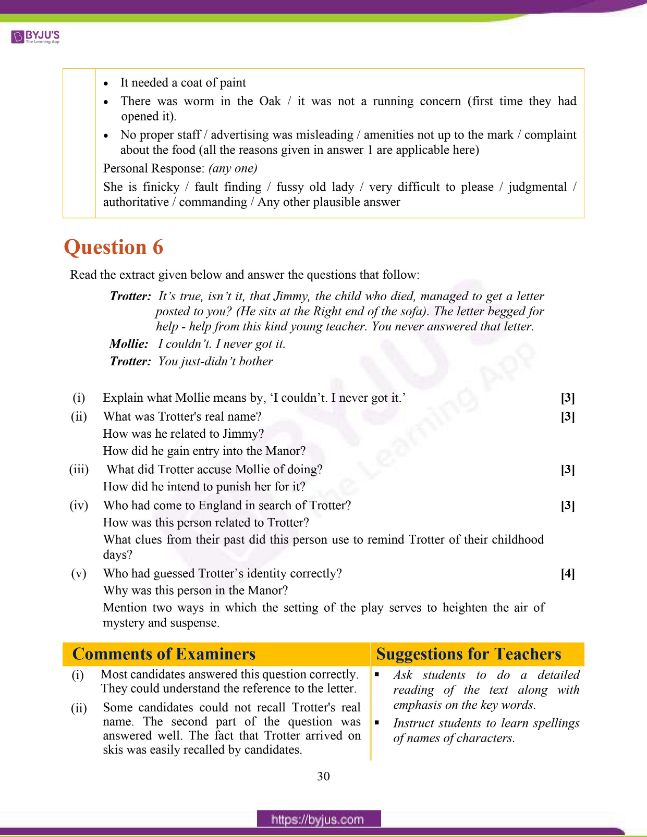
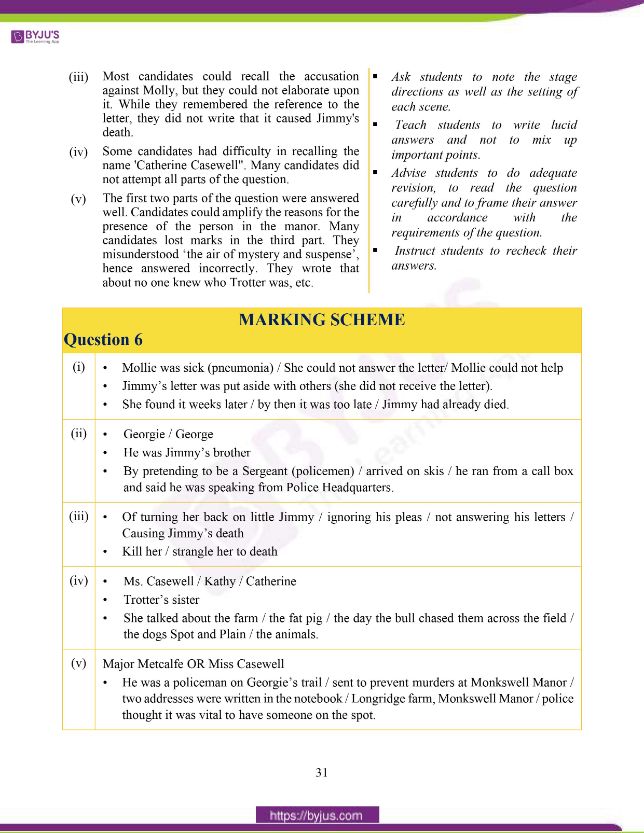
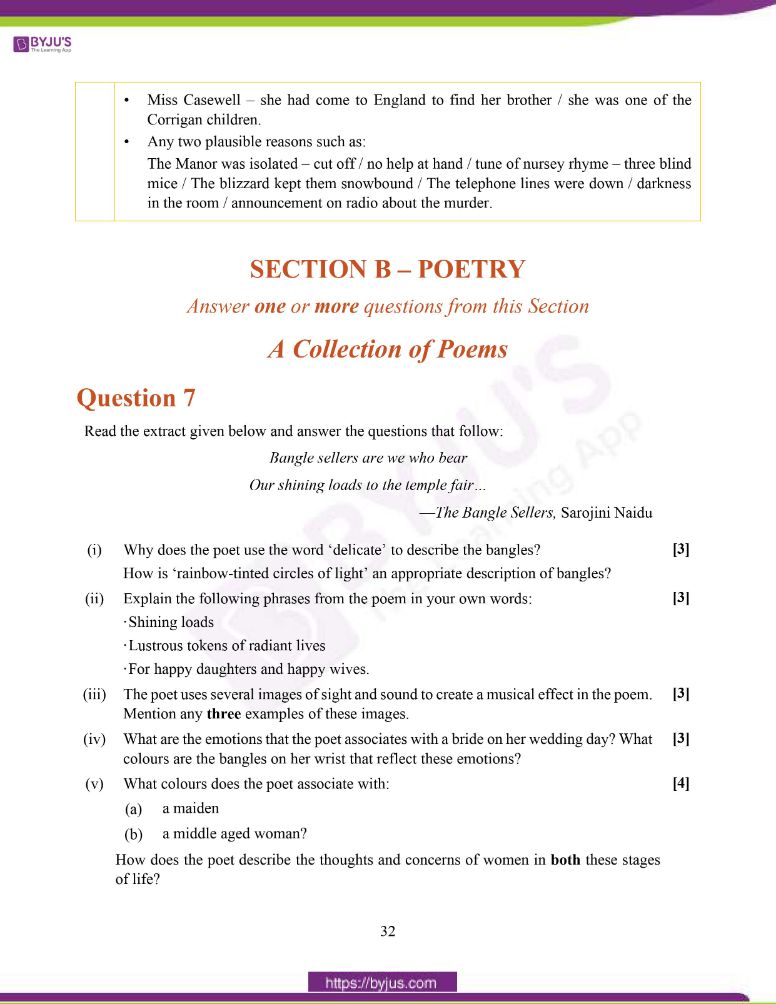
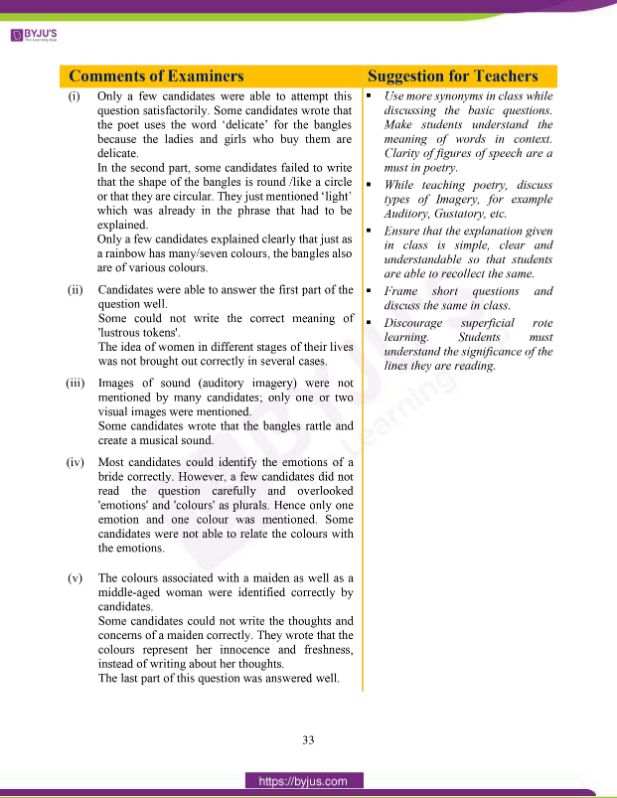
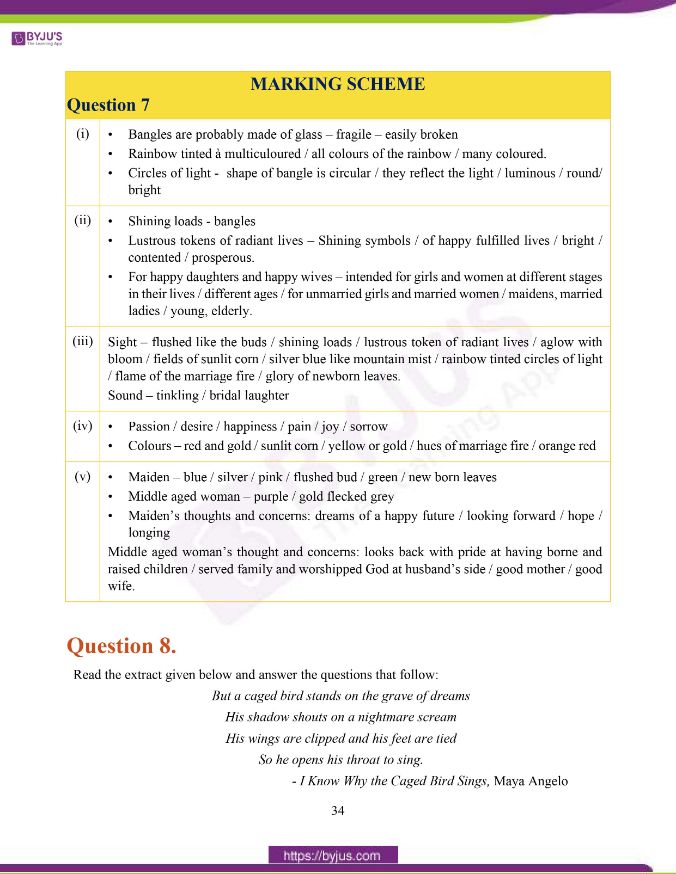
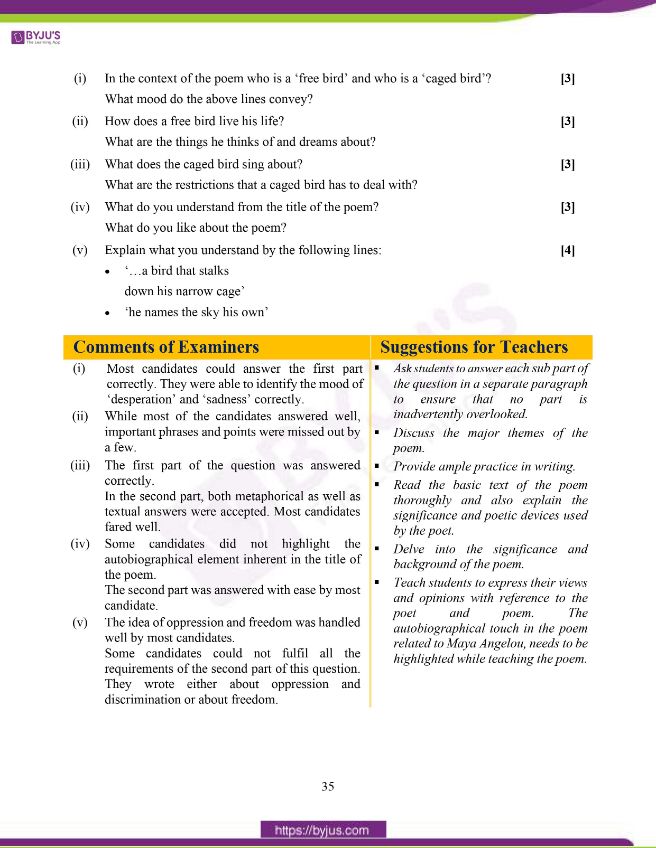
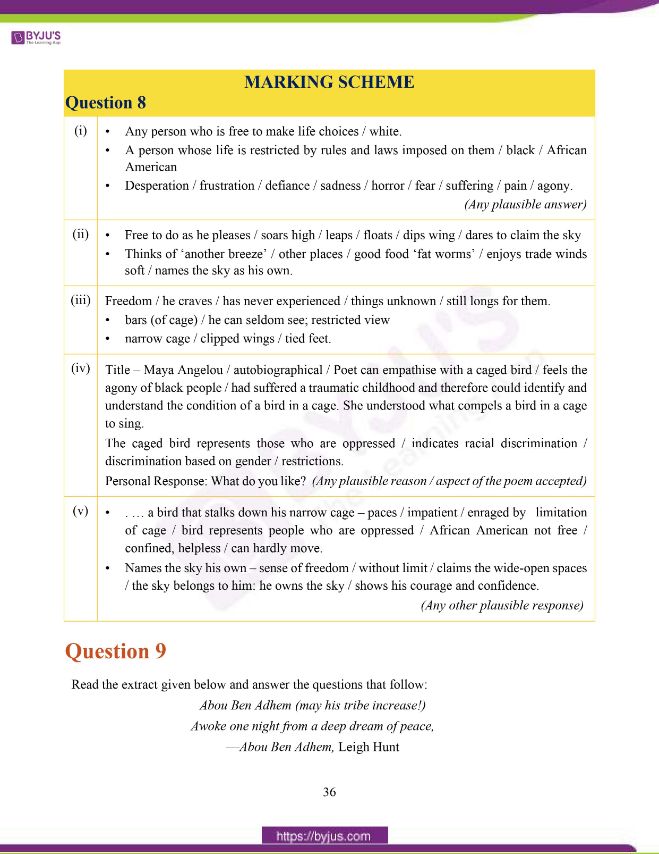
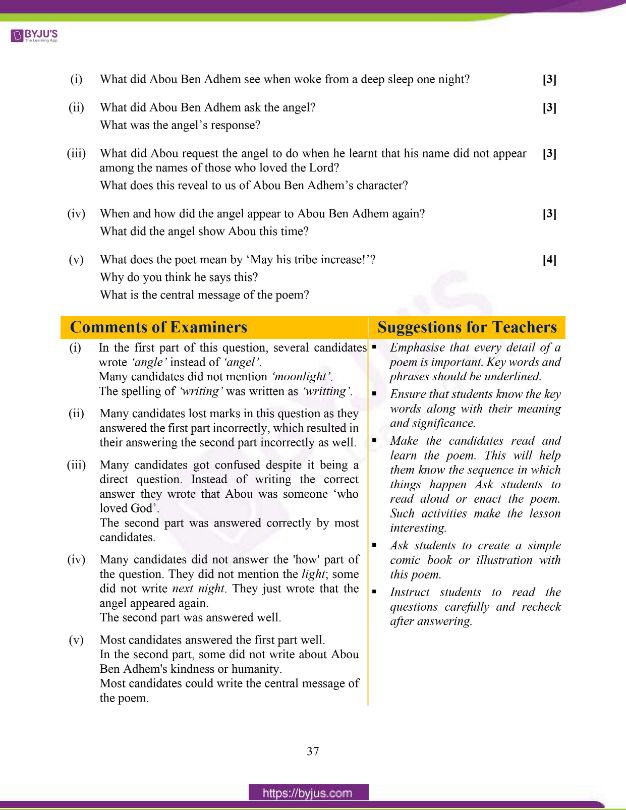
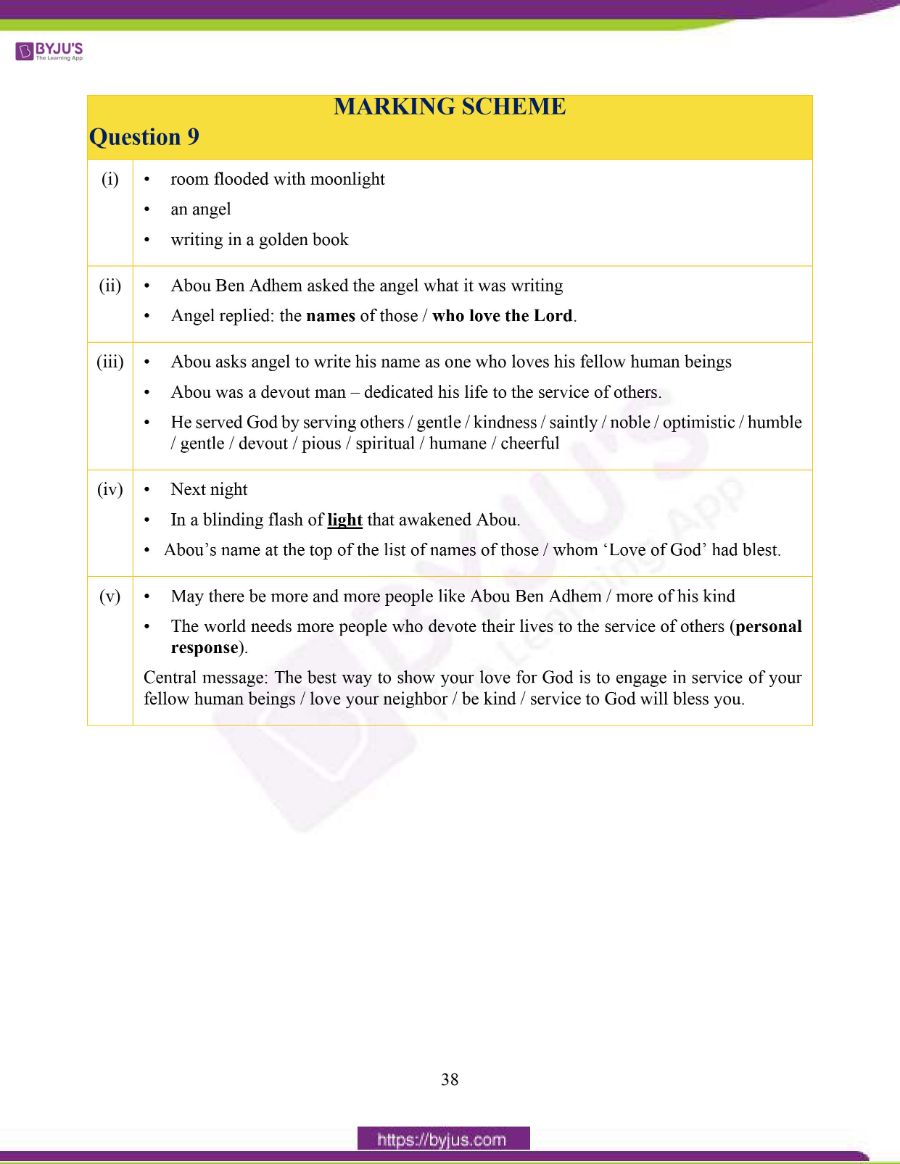
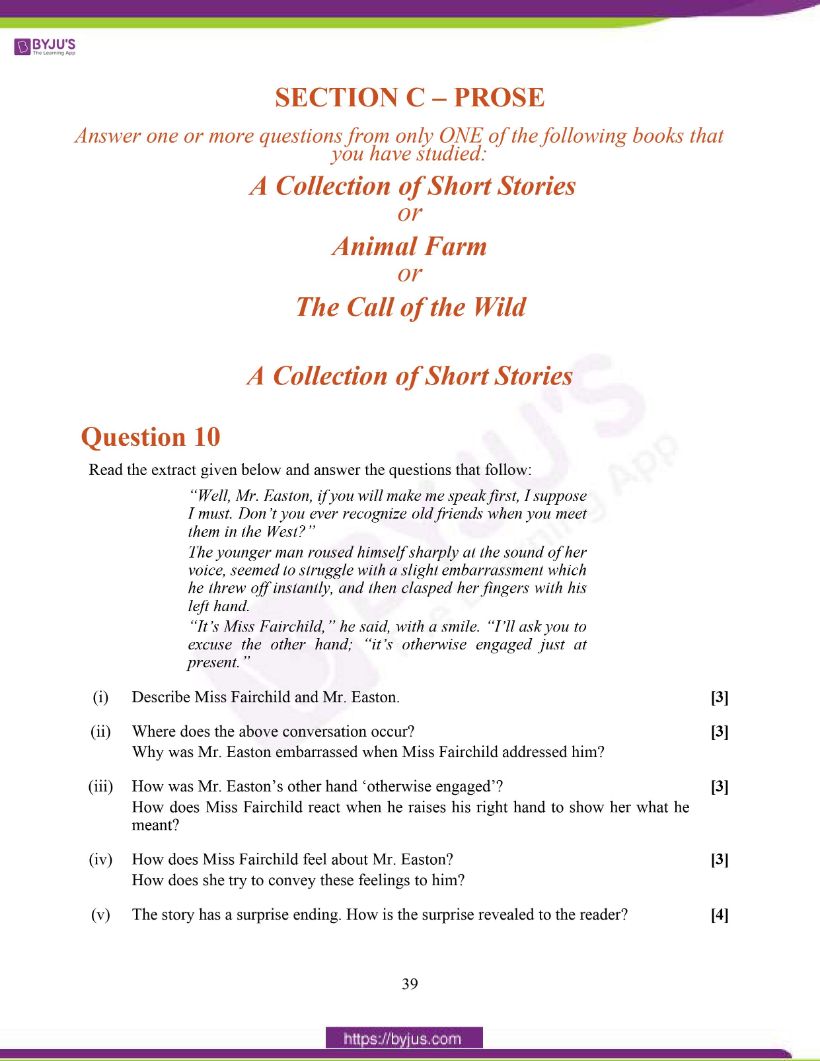
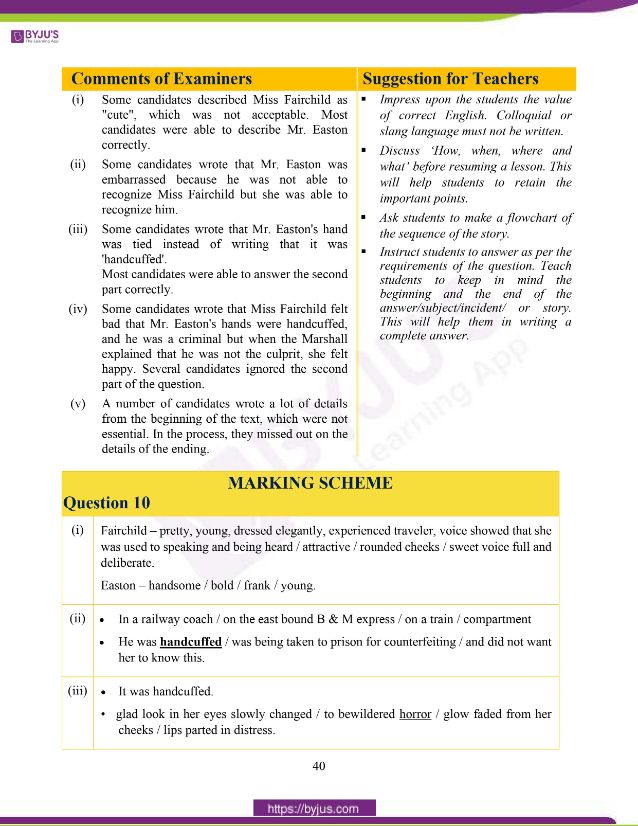
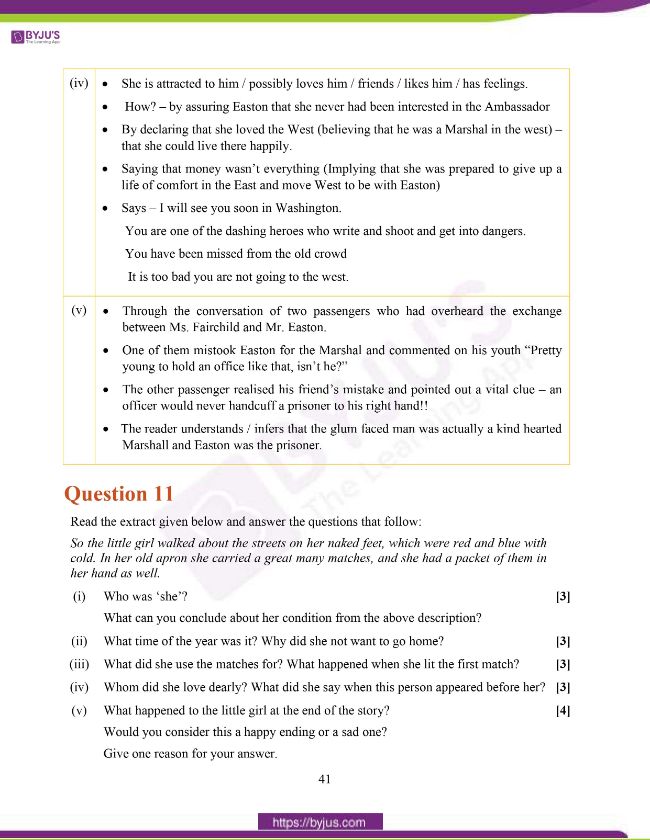
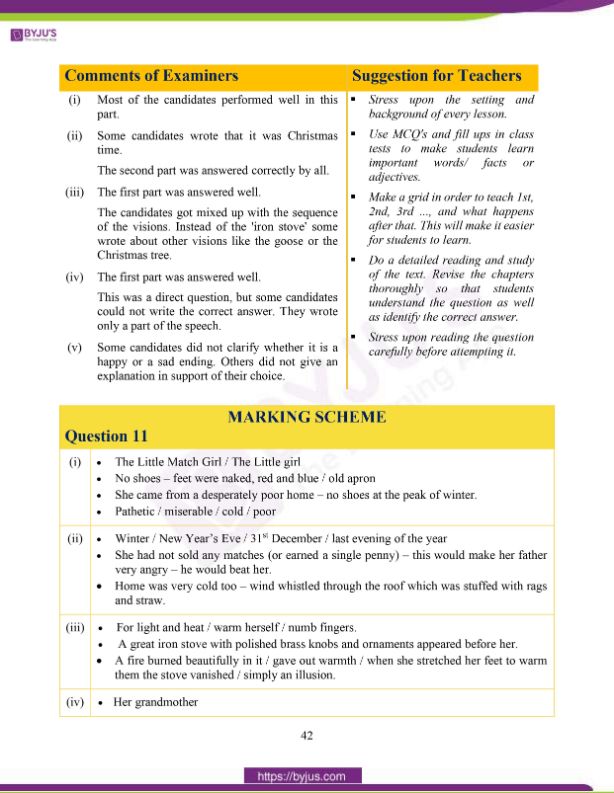
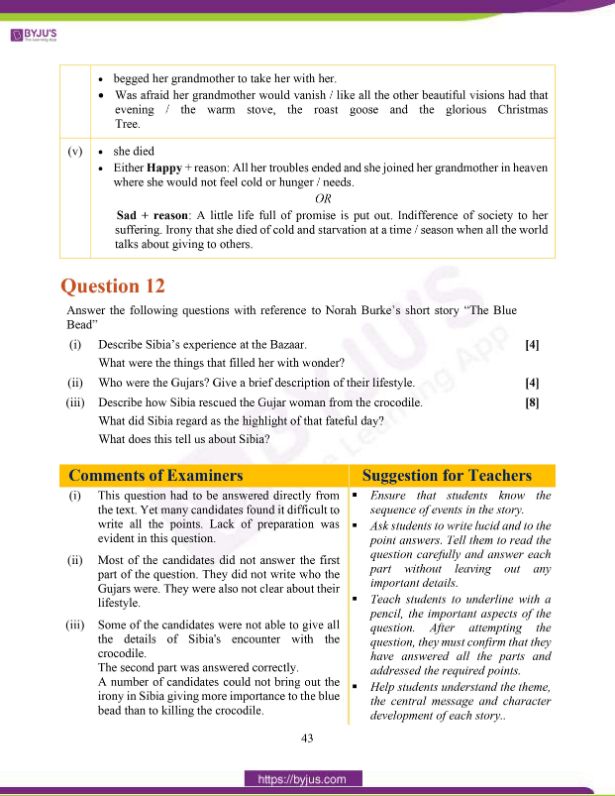
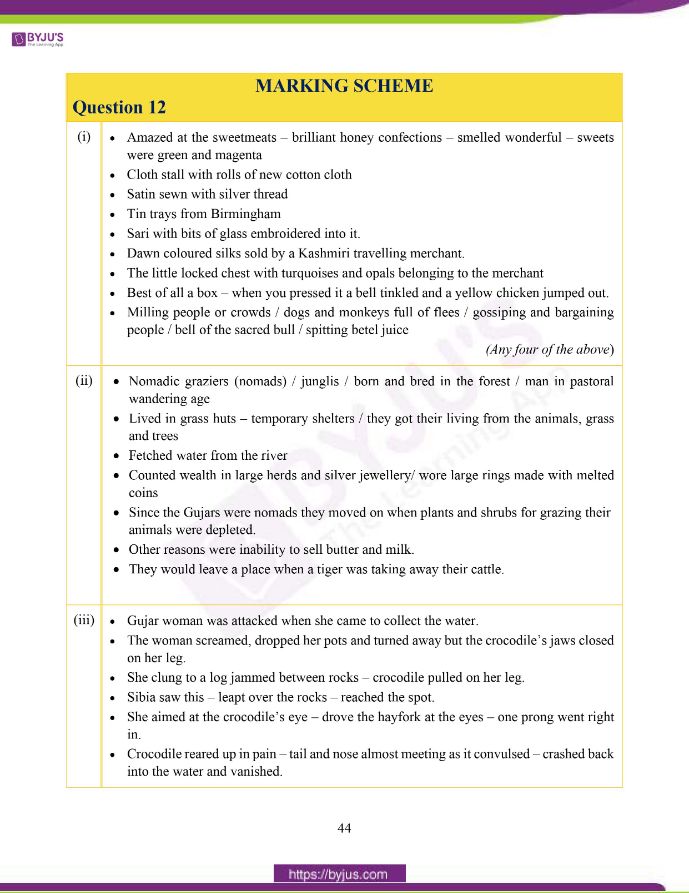
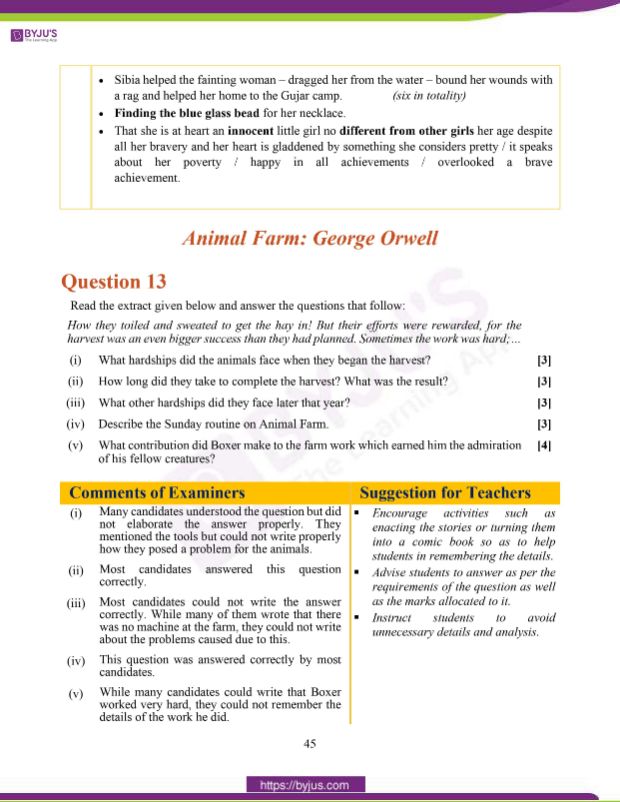
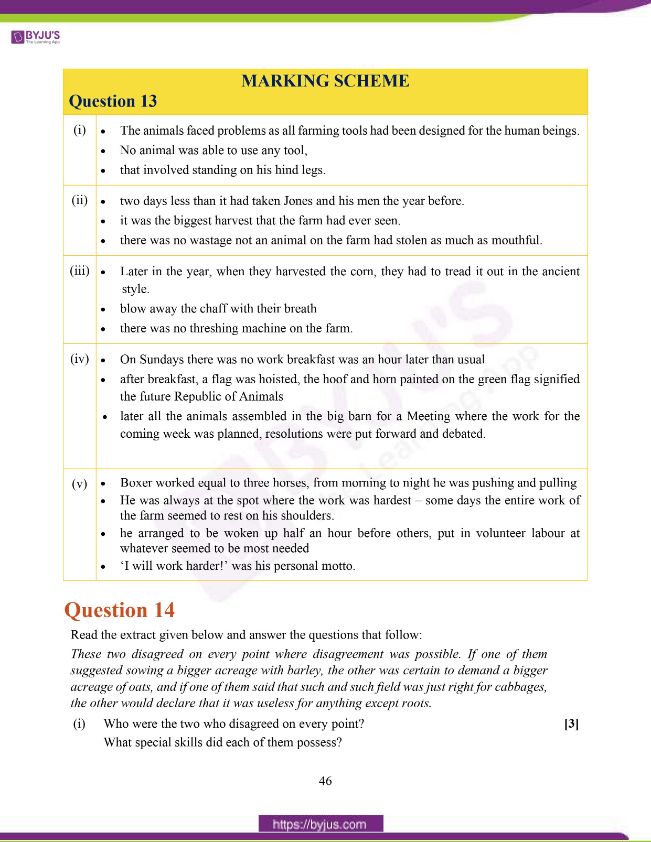
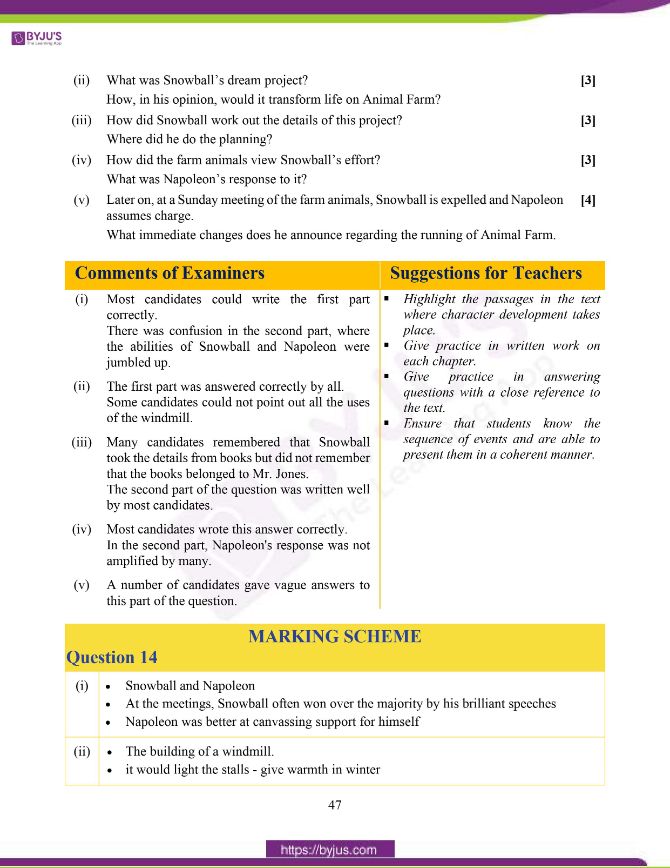
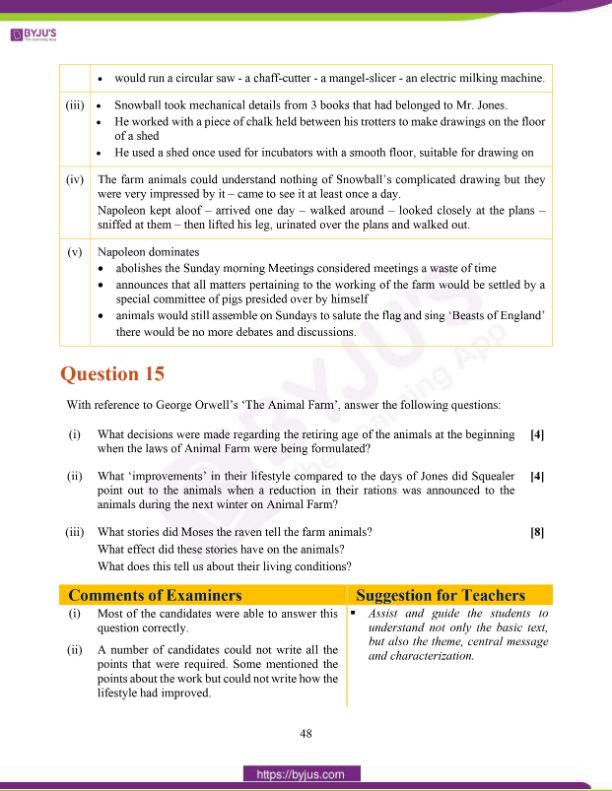
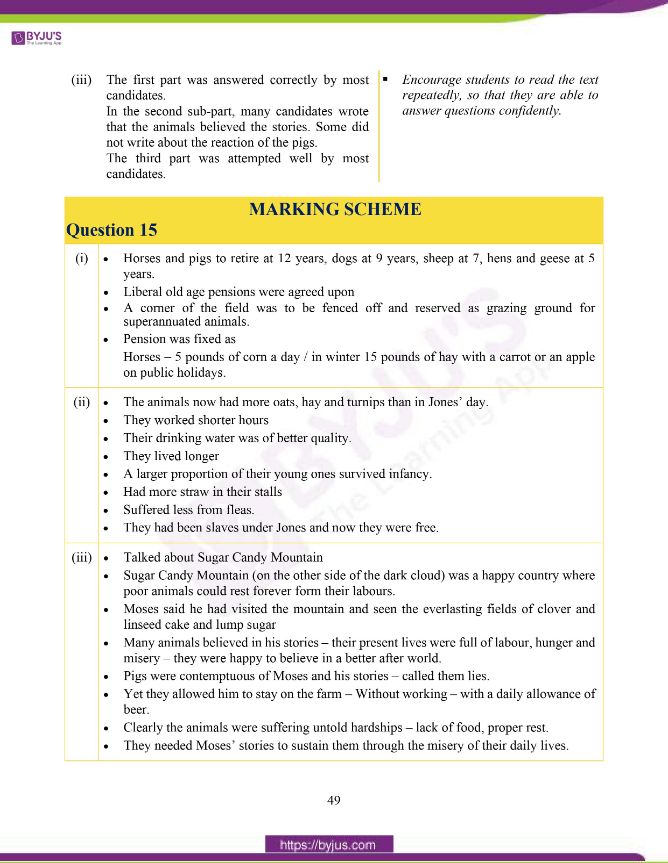
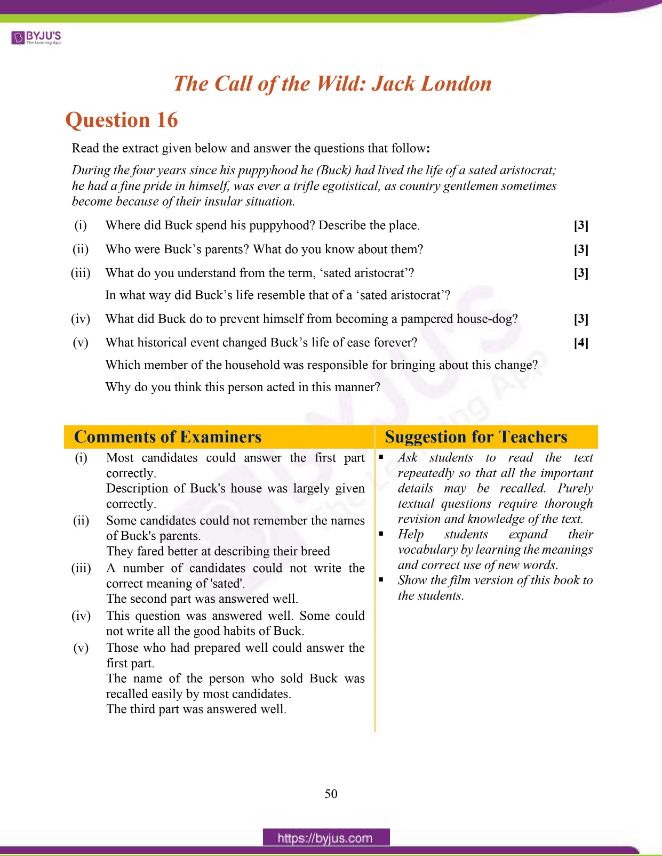
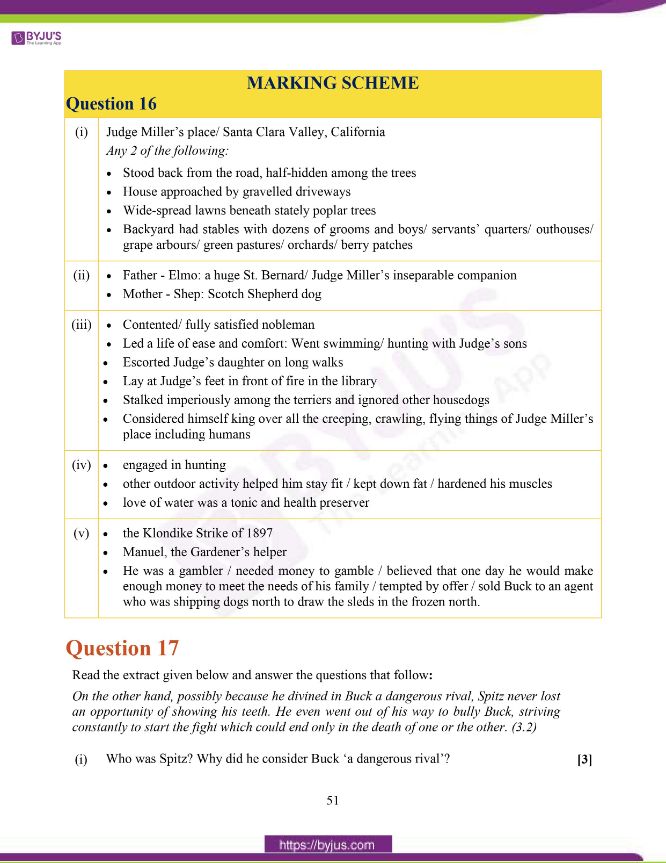
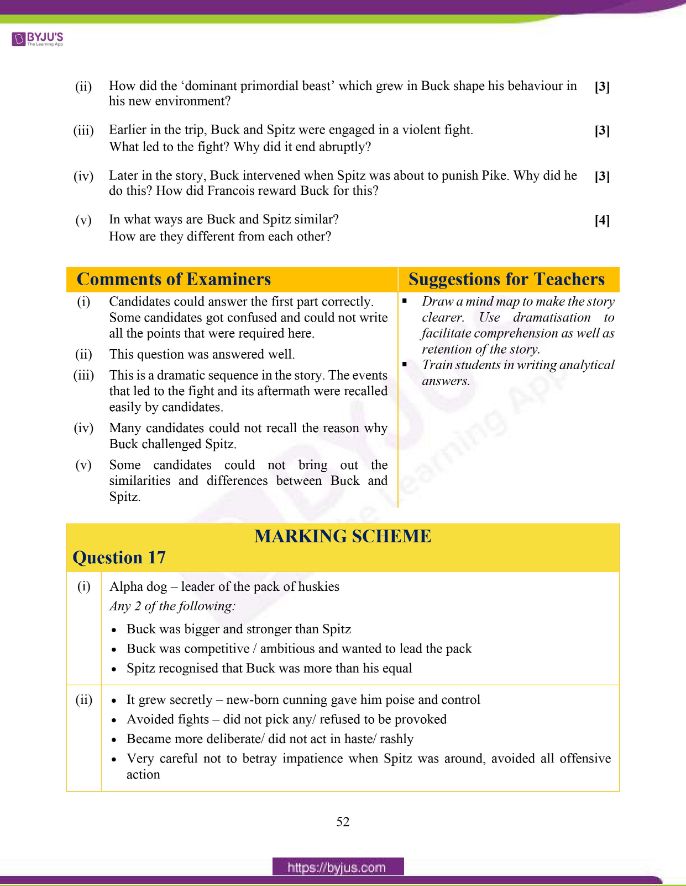
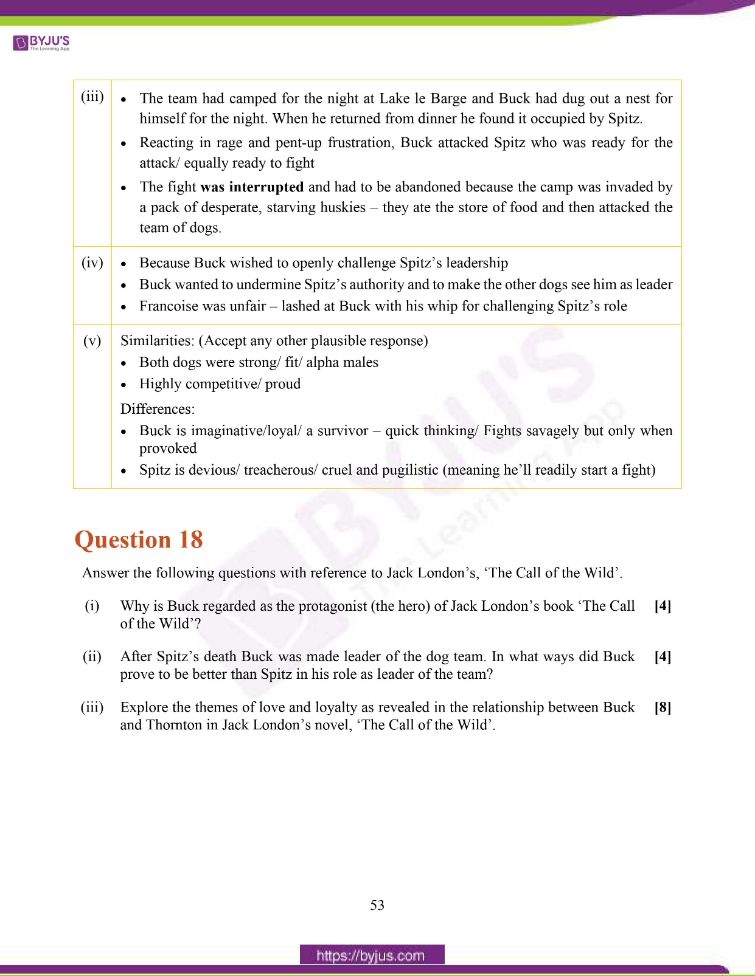
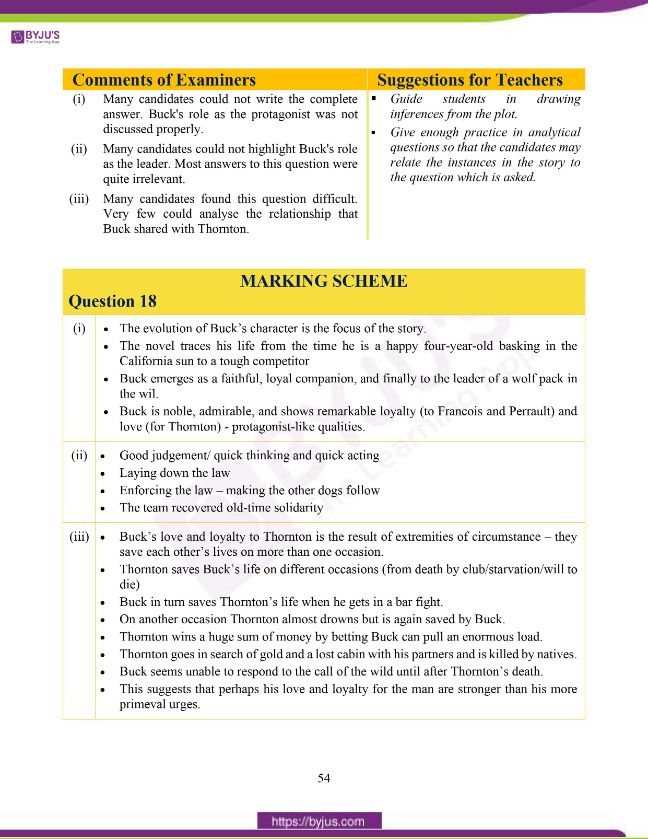
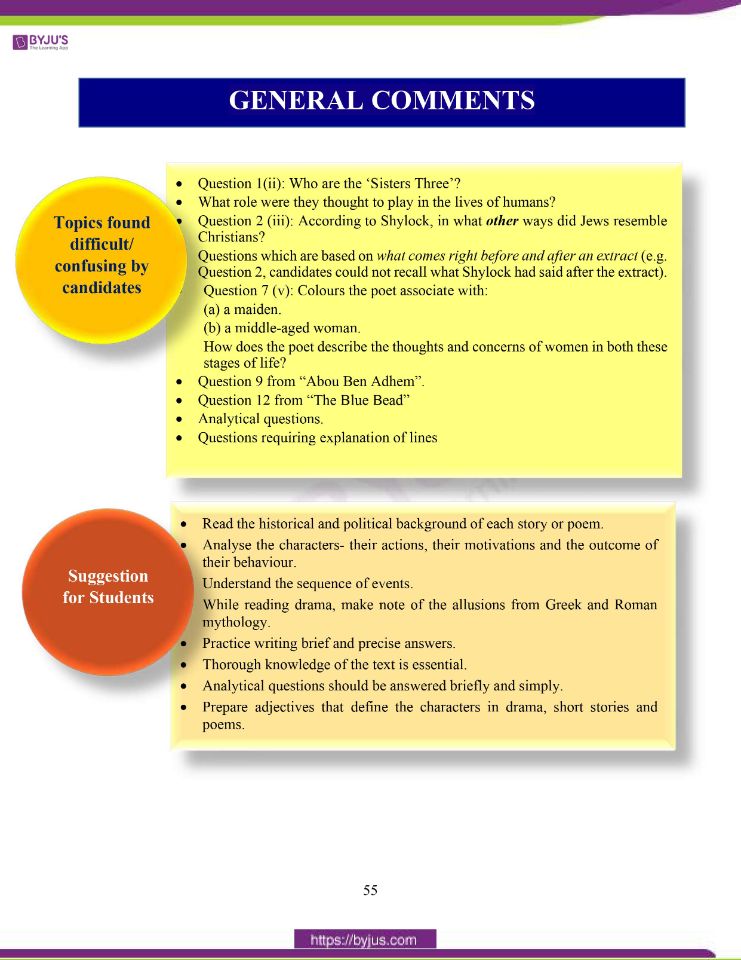
Comments